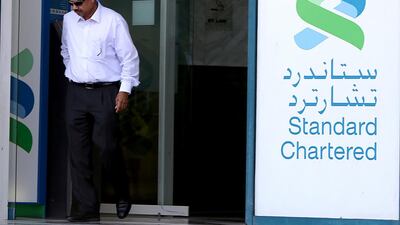Standard Chartered is seeing signs of recovery in its UAE retail banking business as credit card spending rebounds and demand for mortgages grows, after a number of difficult years marked by job losses and low consumer confidence.
This chimes with what analysts have been finding across the country’s banking sector as a whole. The global consultancy Alvarez & Marsal, in its inaugural report on the UAE banking sector last month, found increasing signs of recovery following the tough times.
At Standard Chartered, Shehzad Hameed, the head of retail banking, said that sales of its retail products are growing at a strong pace that should stay that way all year long.
“Sales have had double-digit growth in the first quarter of the year,” Mr Hameed said last week. “We expect this to sustain throughout the year. Last year was a tough year for the retail business.”
Mr Hameed said that Standard Chartered was lucky to have a big base of affluent customers who have been taking on mortgages with greater gusto as well as making more investments through the bank and spending more with their credit cards.
Standard Chartered is not the only UAE bank to report an improvement in its retail business. Dubai’s Mashreq Bank said last month that it likewise has noticed a pick up in credit card issuances and spending since the beginning of the year.
The bank said last month that operating income in the Middle East and Africa fell by 3 per cent in the first quarter amid currency devaluations in Africa and lower financial market income from the Middle East.
Operating income fell to US$686 million in the first three months of the year compared with $709m in the same quarter last year, the bank said.
In November, the bank, under pressure from declining oil prices, said that it was cutting 150 jobs in the UAE amid a lending slowdown.
The bank in 2015 revealed plans to shed 15,000 jobs worldwide after years of losses, but it did not say at the time how many positions would be lost across its local operations. The lender has been badly hit as the value of most commodities, which underpin the economies of many emerging markets including that of the Arabian Gulf, have fallen sharply.
While the profitability of UAE banks has been dented in recent years, Alvarez & Marsal said the sector remains in better shape than its global peers.
The oil slump led to an increase in borrowing by governments to reduce deficits, but at the same time the slump has softened demand for loans among local corporations and increased the level of debt defaults. Among the hardest hit have been small and medium-sized businesses. Despite the recent woes of the banking industry there are some signs to cheer, such as an increase in lending, despite the provisions that banks are continuing to take, as well as tighter control on expenses, the consultancy said.
“The good news is we are seeing signs of this downward cycle bottoming out,” said Saeeda Jaffar, the managing director at Alvarez & Marsal.
mkassem@thenational.ae
Follow The National's Business section on Twitter

